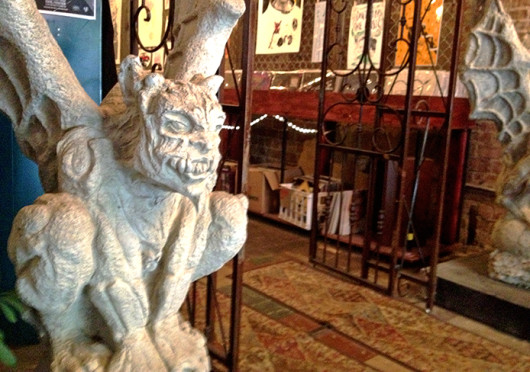
A gargoyle statue sits inside Vinyl Frontier, a record store which was located at 51 E. Gay St. before closing in July. Credit: Courtesy of Justin Crockett
While Vinyl Frontier had to shut down its business, the spirit that kept the Columbus record store alive still lives within owner Justin Crockett.
The store closed down about two months ago from its location at 51 E. Gay St., after being in operation from Oct. 6, 2012, to July 16.
Besides functioning as a record store, Vinyl Frontier sold used CDs, used magazines and accessories. There was also a performance space at the front segment of the store for anyone who would like to perform, regardless of their age and the genre of music.
Touring artists, high school bands and local DJs would submit requests to perform at the Vinyl Frontier space. At least three times a week, the store would see multiple performers a day perform for the public.
“It’s really interesting to see young kids come in there with this being their first gig and they’re all excited,” Crockett said. “They have their friends there and obviously, no one buys anything because they’re teenagers, but it’s cool that they get to hang out.”
“Join the revolution” was the tagline the record store frequently used during its time, relating to its backstory that was set in a post-apocalyptic world. In his story, survivors of humanity were scattered across the ruined urban landscape, never coming in contact with one another, until one day, a mysterious DJ appears to bring these people together through music and dance.
“The idea of the revolution is to build our own revolution,” Crockett said.
When the record store announced its closing, many people expressed their disappointment on the store’s Facebook page. The Record Breakers, hip-hop disc jockeys that called the store home for their live broadcasts every Friday, were extremely “torn up” when they were told of the news, Crockett said.
Never once did Crockett or his business partners require artists to pay to perform in the store, nor did he ask for any kind of compensation when the record store was used as a backdrop in local music videos.
“It was going to be a different kind of store because we had totally different values, where our creativity and support for the community came before making money, and that obviously was the case because we had to close down,” Crockett said.
It was important to Crockett to make Vinyl Frontier a community-based project where people could go to express their creativity through art and music. The store also served as a creative space for him, as almost everything was built in the store to fulfill the backstory he created for Vinyl Frontier.
“To take the ideas from just sketches and descriptions in a notebook and translate them to actual, physical space was very exciting,” Crockett said. “We built the racks, the counters and all the displays so the whole thing was our creative outlet.”
Crockett and his business partners traveled as far as Vancouver to survey other record stores and to obtain the metal archways, gargoyles and lights for the shop.
“It had seemed that every city I went to had that one shop that was very exceptional for one reason, and I thought, Columbus had a lot of music stores, but none of them really popped,” Crockett said.
While the record store was the dream for Crockett, when he had to start subsidizing the business from his personal funds, he knew the business wasn’t sustainable anymore.
Steve Louis, owner of Records Per Minute at 2579 N. High St., said he tried advising Crockett against his decision to close down Vinyl Frontier.
“While he was open, we bought a big collection together, and when he decided to close, he sold some of his inventory to my shop,” Louis said. “I thought he had a good shop and I didn’t think he should have closed the shop.”
Noah Kritz, a second-year in computer science and engineering, said it was a pity Vinyl Frontier had to leave the city.
“His heart was in the right place with helping the community and helping others, giving them the opportunity to use his store for free,” Kritz said. “For them to close down after that, facing repercussions that he didn’t think about, that’s kind of sad.”
Crockett was a full-time firefighter and a part-time paramedic at Ohio State’s Center for Emergency Medical Services for 11 years before opening the store. It took four years for his ideas to finalize and actualize into reality.
“All this negativity I’ve been soaking up for years as a paramedic, I felt like there’s a real disconnect from person to person,” Crockett said. “I wanted something that could spark that way of thinking, that your life is about getting out and being part of this world around you and using all your senses and giving to people.”
Since the store’s closure, Crockett, who is still a firefighter, has been sorting out the financial aspects of his life and has been wondering if he would want to run a business again.
“Apart from the crippling debt load, I would do it again,” Crockett said.
Although the current storefront bears no recognition of what it used to be, Crockett said he is determined to continue the “revolution” one day and achieving the “half-realized concepts” he had.


